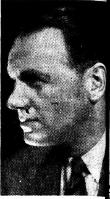From the Bowen Independent (Qld. : 1911 - 1954), Tuesday 28 September 1943, page 1.
ATHOLL FLEMING—SOLDIER & PRODUCER His Dramatic Experiences in Four Mediums.
ATHOLL FLEMING, who is now producing for the A.B.C. “While the Band Flays” on Mon-day nights, has had experience in four branches of drama—stage, radio, film and television. Of these he says that the stage is the most satisfying medium, radio the least exacting, and television tne most terrifying. He explains that acting for television is very like acting for films, except that if a mistake is made there is no second chance. Atholl Fleming began his acting career in a hospital at Edinburgh, where he was recovering from wounds received in the last war. "We put on an amateur show called Browne with an E," he said. "I played juvenile. Imagine my disappointment when I found that the only comment the hospital magazine made on my appearance was: 'The juvenile lead made love as though he had been sentenced to it by a court-martial’." After his demobilization from the Royal West Kent Regiment in 1919, Atholl Fleming joined the staff of the Bank of England, but realising that his job was interfering with his acting, he decided to take the plunge and go on the professional stage. Mr. Fleming had a season in repertory at Cardiff. In the same company were Rex Harrison, playing juvenile, and Christine Barry, now Mrs. Gordon Barker, who was leading lady. Mr. Fleming tells of an amusing incident relating to Rex Harrison. "In one play, Rex was supposed to be put into a nursing home by his wife, who wanted to rid her-self of him, and he had to escape by persuading one of the nurses to bring him some clothes, so that he might climb out of the window. One night, when the nurse in the play went to get the clothes, there were no trousers there, so she turned frantic-ally to the stage manager and asked, what should she do; as there wasn’t time to look for others. The stage manager hesitated for one second, then said: ’Don’t look!’ removed his own trousers, handed them to the nurse, and then went with bare legs to ring down the curtain." The next step in Atholl Fleming's career was an engagement to tour South Africa with Phyllis Nielson Terry. After this season he remained in Africa to play with the Sybil Thorndike Company, with which he later re-turned to England, and under the Thorndike management he did Shakespearean work, appearing in “Macbeth”, "The Merchant of Venice", "The Taming of the Shrew" and "Much Ado About Nothing". After eighteen months in South Africa he returned to London and set about looking for work in the West End. His first chance was as an understudy in "The Rising Sun" at the Kings-way Theatre. Instead of playing the understudy, however, three nights before the show opened, he was given the actual part to do. This lucky break gave him an excellent London start, and he appeared in a number of Shakespearean and other plays. Touring Australia with Sybil Thorndike and her husband, Lewis Casson in 1932, Atholl Fleming played Dunois in "Saint Joan", Macduff in "Macbeth" and Sir Howard Hallam in "Captain Brassbound’s Conversion". It was during this tour that he met and married an Australian girl, Miss Phyllis Best. Shortly after war broke out Mr. Fleming returned to Aus-tralia from London, with his wife and young son, Robert, whose godparents are Dame Sybil Thorndike and Lewis Cas-son. He took over Ian Keith’s part in "Yes, My Darling Daughter" at the Minerva Theatre in Sydney, and then went to New Zealand for Australian-New Zealand Theatres Inc. In his spare time, Mr. Fleming likes to write. As well as acting the part he wrote the scripts for Septimus Seedling in "Mas-querade". In the "Sydney Morn-ing Herald”, under the pen-name of "Thalia", he published a series of humorous articles on war activities, with the idea of keeping up morale."
As 'Mac' and 'Jason', Atholl Fleming hosted 'The Argonauts' Club' on ABC radio for its entire run (1941-72). He also produced radio plays for the ABC during the 1950s including Dorothy Blewett's Quiet Night.
 2136655222663195042.png
2136655222663195042.png